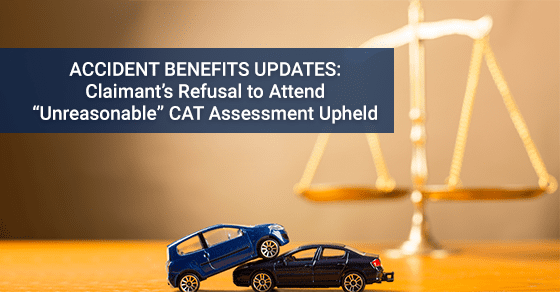
G.P. v. Cumis General Insurance Company, a recent claim before the Licence Appeal Tribunal (LAT), concerned G.P.’s application for a determination of catastrophic impairment and several denied treatment plans. G.P. had been injured in a motor vehicle accident in November 2013. She sought treatment from her automobile insurer, Cumis, under the Statutory Accident Benefits Schedule (SABS). After agreeing to fund her initial treatment, Cumis denied several treatment plans. G.P. commenced an application to dispute the denials with the LAT. Around the same time, she submitted an OCF-19 ("Application for Determination of Catastrophic Impairment" or "CAT application") prepared by her physician, Dr. Marciniak, who stated the opinion that she suffered from an impairment or combination of impairments that resulted in 55 per cent or more impairment of the whole person (WPI) and therefore met the test for catastrophic impairment under the SABS.
Cumis rejected the CAT application, claiming that it required more information before making the determination. As a result, it scheduled a series of 5 CAT assessments including: a psychiatry assessment, an in-home OT assessment, a community functional assessment, a physiatry assessment and a cardiology examination.
G.P. attend the first three assessments but refused to participate in the final two because they were not reasonably required and represented an invasion of her privacy.
In response, Cumis brought a preliminary issue hearing claiming that G.P. was not entitled to proceed with her CAT application because she had failed to attend the final assessments.
At the preliminary issue hearing, the parties agreed that the proposed cardiology examination could proceed by paper review. Regarding the proposed physiatry assessment, the Tribunal rejected Cumis’ position, and found that it was not "reasonable and necessary" under the SABS. It ordered that the application should continue as scheduled. Cumis applied to the Executive Chair for a Reconsideration of this decision, claiming that it had a right to the physiatry assessment which was required to make a full defence to G.P.’s application, and that it would be prejudiced in its case at the hearing without the assessment.
Executive Chair Lamoureux reviewed the decision on the preliminary issue, which was based on several findings:
- First, Cumis had access to the physical examination performed by the OT and two others that provided enough evidence for a physiatrist to assess the WPI rating for physical impairments. This was clear because the responding CAT assessment had already been completed without reliance upon the disputed physiatry assessment. In this CAT assessment, the lead assessor observed that an in-person physiatry assessment would be "optimal" and would "stand up in court". The Tribunal emphasized that the test for compelling attendance at insurer examinations is whether they are "reasonable and necessary", not "optimal". The goal was to balance the insurer’s need to gather evidence with the claimant’s right to privacy.
- Second, granting Cumis the physiatry assessment would lead to an otherwise unnecessary escalation of proceedings, because G.P. would be required to get a responding physiatry report. This would cause delay and added costs, contrary to the mandate of the LAT.
· Third, , G.P. had already participated in three in-person examinations, an amount that the Tribunal found "significantly intrusive" given her psychological condition. Although the physiatry examination was requested because it was "optimal," a paper review would have been equally possible. The further intrusiveness of an in-person physiatry examination was not outweighed by its necessity or reasonableness.
- Finally, the tribunal found that given the existing evidence before Cumis, there would be no prejudice to its ability to perform the CAT assessment or attend the hearing.
Cumis challenged each of these findings. In essence, Cumis claimed that an OT was not qualified to perform the appropriate assessment for the evaluation of G.P.’s CAT claim, and that as a result, G.P.’s evidence would be favoured at the hearing. Implicitly, Cumis was hoping that its hired physiatrist, Dr. Oshidari, would be able to downplay the severity of G.P.’s injuries and ongoing impairments in his report.
In rejecting these argument, the Executive Chair explained that this argument relied on a misconstrued reading of the Tribunal’s decision. As set out above, the OT assessment provided sufficient evidence relating to G.P.’s physical impairments for a physiatrist to complete the CAT evaluation of WPI. The source of the evidence was not determinative of the impairment ratings that followed. As a result, the she refused the reconsideration and ordered the hearing to proceed.
Subscribe to our newsletter
Get free insights delivered right to your inbox
Give us your email address and we’ll send you the latest information on updates to the legal and insurance system and learn how you can make the best recovery possible.
.jpg?width=726&height=440&name=image%2013%20(1).jpg)
Recent Posts
Put our expertise to work for you.
If you or a loved one has been seriously injured, you need a personal injury lawyer who puts client care first and who also knows how to navigate the complex legal system.
Contact Us Now